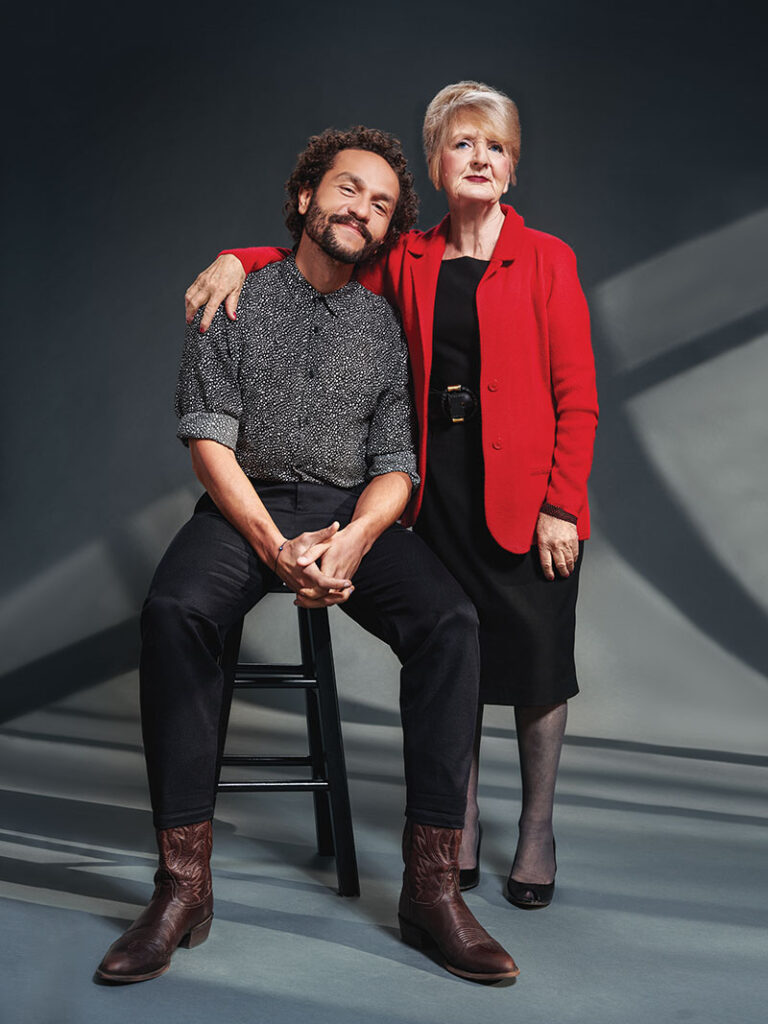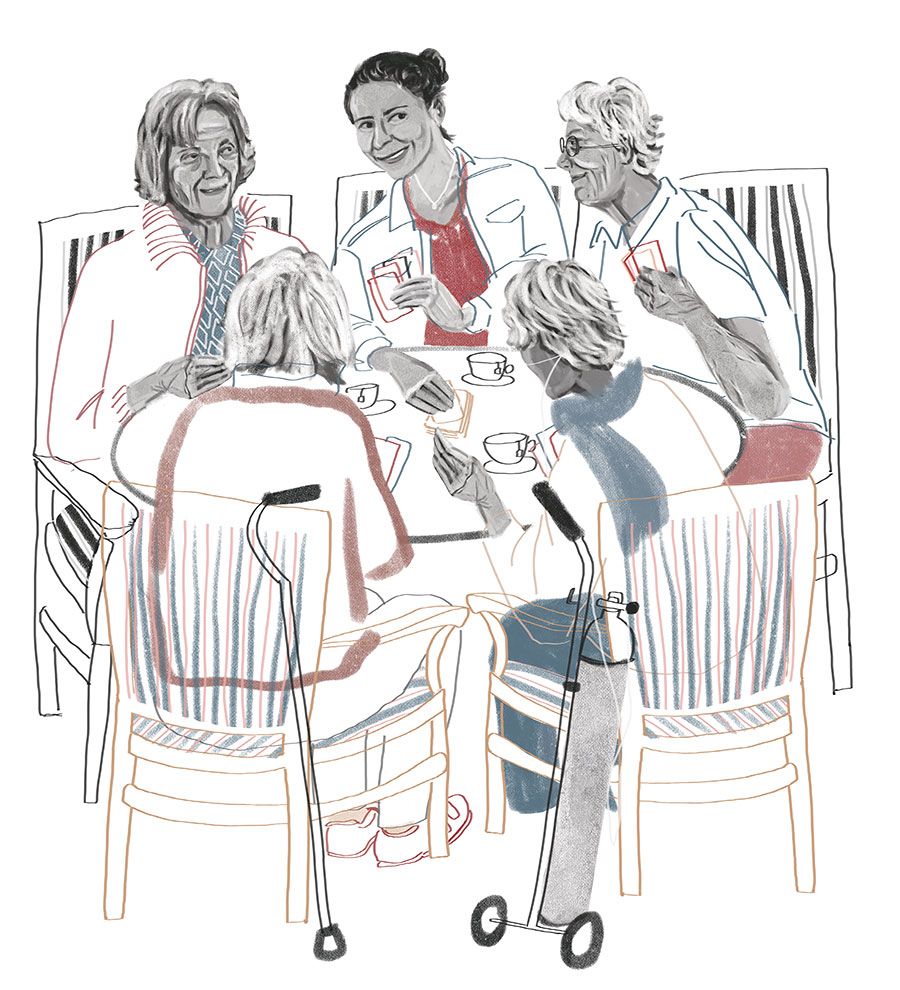Different generations support each other through the course of life.
As the plane ascended into the sky, Sian-Pierre Regis ’06, H’18 gripped his mom’s hand while they nervously smiled into the breeze from the open door. In mere minutes, Regis and his 76-year-old mother, Rebecca Danigelis, would jump into the clouds at 12,000 feet over Oahu.
“Here we come, sky … and earth,” she’d said in her English accent, walking toward the plane earlier.
The two had arisen at dawn that Wednesday in January 2018 to check off the final item on her bucket list. As she did every day, Danigelis smoothed her blond wisps into a carefully constructed updo. Regis teased her that she needn’t worry about her hair because she’d be falling at 120 miles per hour. “Hair always matters,” she retorted.
In these scenes and others throughout Duty Free — Regis’ documentary that follows the duo as Danigelis completes her bucket list — the audience gets an intimate look into their relationship. The film also provides food for thought on a vital topic: ageism.
Danigelis is the focal point, and she is frequently shown preparing herself for the day: brushing her hair atop her head, carefully applying her makeup, and straightening her clothing. Similarly, Duty Free shows how she took pride in her employment as a housekeeping supervisor at a Boston hotel, inspecting every inch of a room to ensure perfection. “It’s a hard job, but it’s a very rewarding job because you take things that look like nothing and make them look great,” she says in the film. “Martin Luther King summed it up best,” she added, referencing King’s famous quote: “If a man is called to be a street sweeper… He should sweep streets so well that all the hosts of heaven and earth will pause to say, ‘Here lived a great street sweeper who did his job well.’”
A year and a half before she and Regis leapt out of that tiny aircraft in Hawaii, Danigelis began sensing a shift in how she was treated at work — which she suspects was due to her age. Her employer started reassigning her duties to younger employees, and she was written up for her “tone,” despite a previously spotless employment record. “My value in their eyes is diminished,” Danigelis says in Duty Free. “She felt she was being pushed out,” Regis remembers.
Having dedicated 12 years of her 40-year career to the company, she considered her coworkers to be like family. And she’d raised her real family — Regis and his brother — in their compact apartment six floors above the hotel.
While his mom was working in Boston, Regis was a CNN contributor in New York City and running Swagger.NYC, an online cultural magazine for millennials. It came as a shock to them both when she was fired, given only two weeks’ pay, and told she was allowed to stay one remaining year in the apartment.
The pride that usually shone through Danigelis was dampened. “I feel dispensable, and that’s something I’ve never felt before,” she says in the film.
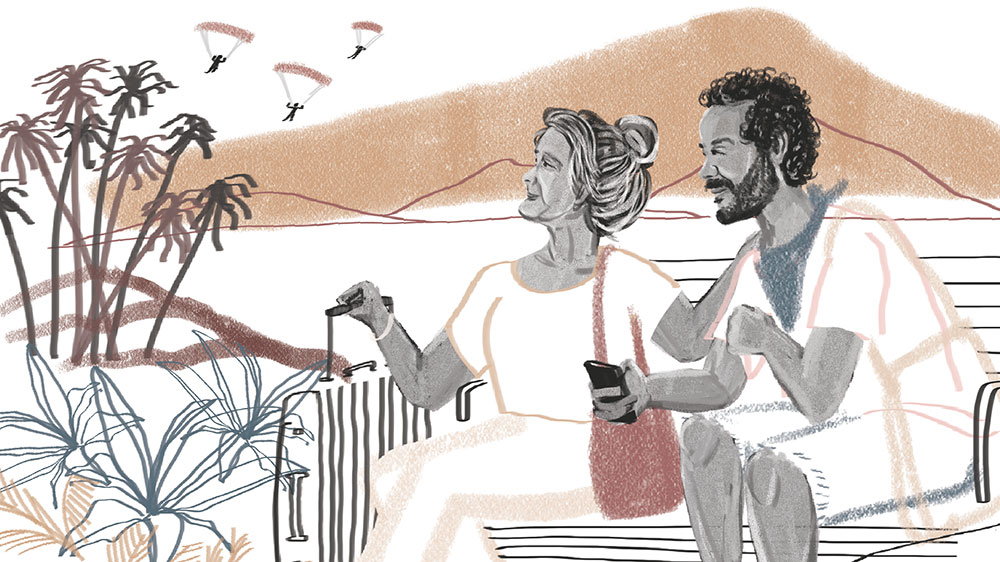
For Regis, it was a no-brainer to take action. “I had an emotional, visceral reaction to uplift her,” he says. She’d always supported him — including using her savings for his Colgate education in sociology and anthropology — so he wanted to thank her.
At 32, Regis put his career on hold and devised a plan. “I had this crazy idea… I could take her on this bucket-list adventure to do all the things she couldn’t do while she was working, that she put to the side for these people who didn’t care about her.” To enlist financial support — for both their adventures and the film he’d started documenting as soon as she began calling him with work concerns — Regis launched a Kickstarter campaign on Mother’s Day in 2017, raising $60,000.
Media outlets from ABC News to the New York Times to People magazine covered the story. It even got picked up abroad. “Ageism is mostly an American concept, but connecting with other people is universal,” Regis says.
Duty Free — which premiered this Mother’s Day — is a “buddy film,” where he’s the Robin to her Batman, Regis jokes. It follows Danigelis as she learns hip-hop dancing, milks a cow, and reunites with relatives in England whom she hasn’t seen in years. In Danigelis’ darker moments, it also shines a light on hardships that older Americans can encounter, such as economic insecurity and age barriers to employment (e.g., technology, stigma). Through it all, Regis is by her side.
“It was an amazing experience because of how much time we’ve spent together,” he says in Duty Free. “One thing that’s been a realization for me is the importance of having advocates … everyone needs an advocate to survive.”
Regis was named a 2020 Influencer in Aging by Next Avenue. (“My mom is the real influencer,” Regis contends.) Danigelis moved into his New York City apartment, and the two are launching an impact and engagement campaign to support caregivers who are less fortunate. They’re using the film as a catalyst to talk to policy makers about this issue. On a personal level, the mom-son duo has heard from people around the world who identify with Danigelis because their employers forced them into early retirement or laid them off late in life. “My mom’s story was more universal than we could have ever imagined,” Regis says.
Caring for Grandchildren
More than 65 million people in the United States provide care for a chronically ill, disabled, or aged family member or friend during any given year, according to the National Alliance for Caregiving in collaboration with AARP.
Professor Ynesse Abdul-Malak has been focusing her research on a segment of this group that hasn’t gained much attention: grandparents caring for their grandchildren who have disabilities. Parents, when confronted with a lack of childcare options, often turn to their own parents for help. In the recently released book Grandparenting Children with Disabilities, Abdul-Malak and her coauthor interviewed 50 grandparents “to see how having grandchildren with disabilities affects grandparenting itself,” she explains.
As a sociologist, Abdul-Malak conducted this qualitative research to understand how these grandparents’ caregiving commitment is affecting them financially, socially, emotionally, and physically. For most, the experience elicits mixed emotions of enjoying the time they’re spending with their grandchildren and also handling the strain it puts on them personally. One difficulty is having to provide medicalized care for which they’re not trained and that is outside typical childcare responsibilities.
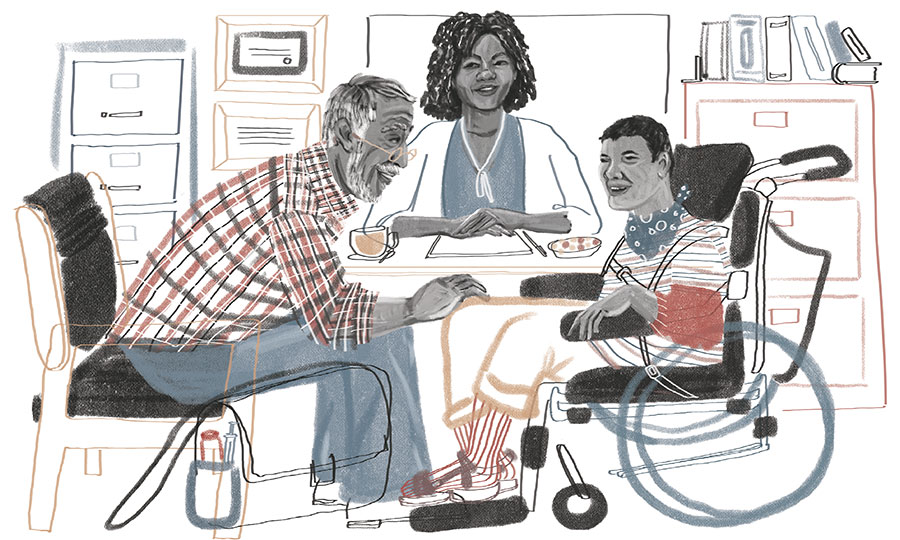
The solution, she asserts, is improving U.S. policy to offer more support. “We know that childhood disability has been increasing recently,” Abdul-Malak says. One reason for this is because there is more awareness about disability, so kids are more likely to be diagnosed. But, she adds, “the federal government as well as employers are not providing benefits to help families respond to the issue of having a grandchild or a child with disability. There is no safety net.”
This research is Abdul-Malak’s latest project as a life course scholar. She studies how the structures that are in place from birth impact a person’s life and the aging process. A large portion of her work has involved talking to immigrants about their home countries, the socioeconomic status they were born into, and their move to the United States, all in order to see how those factors have translated into their current life situation.
For her 2016 coedited book Grandparenting in the U.S., Abdul-Malak interviewed immigrant grandparents. The topic is personal: Abdul-Malak’s mom, with whom she emigrated from Haiti, died young, at age 51. “I could see how my mom was always tired… She was always working a couple of jobs and providing childcare to her grandchildren,” Abdul-Malak says. “After her death, I became quite intrigued in understanding immigrants’ health in the United States.”
Like Regis’ mom, who is also an immigrant, Abdul-Malak’s mother worked as a housekeeper who endured stress due to economic insecurity. “I could see the struggle she went through during her short lifespan,” Abdul-Malak says.
“We are one of the richest countries in the world, and we do not provide the kind of care that families need.”
Intergenerational Parallels
What does a senior in college have in common with a senior citizen? More than you’d think, according to another Colgate life course scholar, Professor Meika Loe.
Issues around independence and autonomy, finding purpose, and vulnerability can cause anxiety for both of these groups, she says. “You have college graduates who are ready to launch into the world, and you have senior citizens who are redefining themselves in pretty dramatic ways. That invention or reinvention process has a fascinating similarity.”
Loe first heard anecdotal evidence of this when she started pairing students with local elders as part of her class titled Sociology of the Life Course. “[The students] came back with stories about very similar struggles in their lives,” she says. “These are chapters of life that are parallel in some ways, that speak to one another.”
Those similarities also emerge as the professor considers her previous research in relation to her new project. For her 2011 book, Aging Our Way: Lessons for Living from 85 and Beyond, Loe interviewed 30 elders about creating meaning and purpose as they lived on their own.
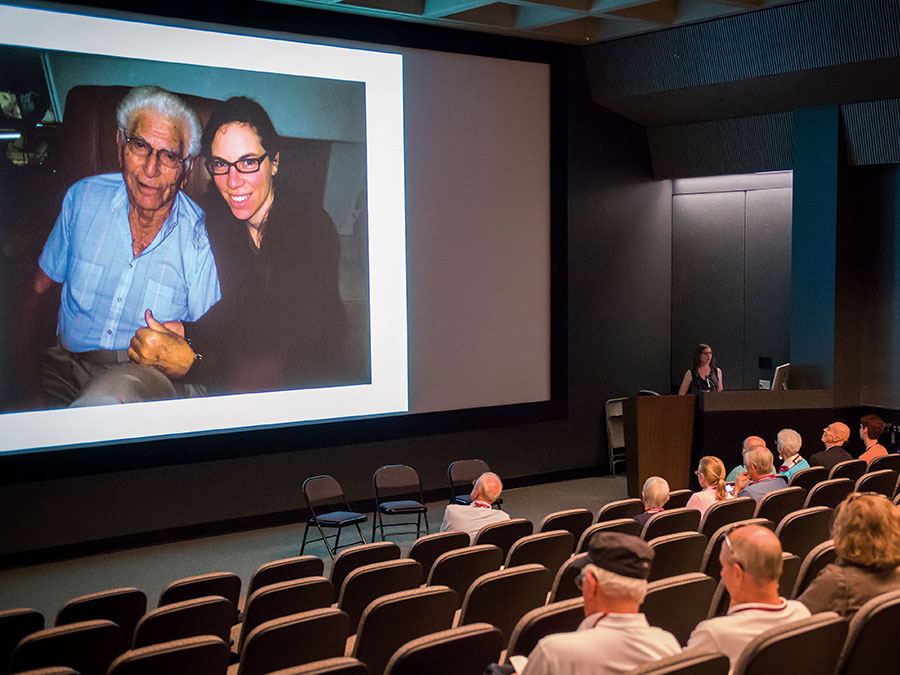
In many cases, Loe says, those elders felt isolated and vulnerable, emotions that have been amplified for senior citizens — and numerous college students — during the pandemic. Last fall, she put out a nationwide call for students to participate in her five-year study on young adults in flux. She’ll be interviewing them a few times a year to find out how they’re navigating work, home, health care, relationships, and identity. “We hear so much about young adults dealing with anxiety and depression — and it’s real,” Loe says. There are challenges with finding employment, for one. And they’re “experiencing this cumulative grief with the loss of rituals in their lives, like graduation or prom … these milestones they’ve had to skip and the sacrifices they’re making.”
Beyond the commonalities between her two research groups, Loe has asked herself, “How do I support them?” All of the elders from her previous study have died, but “I still feel their presence in my life,” she says. The granddaughter of one woman, who lived to 104, recently told Loe that she has been listening to the recorded interviews and loves hearing her grandmother’s voice. Another woman’s granddaughter called Loe to request copies of the book for the great-grandchildren. “For these families, being able to have their elders’ stories clearly mattered,” Loe says. “That’s a beautiful thing [for these relatives] to be in touch with them [that way] and also to know that they lived and died with dignity.” At the time she was interviewing the elders, Loe was caring for her grandfather, which gives her a deeper empathy when she communicates with these grandchildren.
Also, some of the intergenerational connections that Loe’s made through her Sociology of the Life Course continue (as does the class). Several graduates who have moved away still keep in touch with the elders they met in Hamilton. Loe describes the partnerships as symbiotic: “They share their vulnerabilities with each other in a way that you’d never imagine… [With] peers, it’s almost like there are rules for interaction with people in our same age group. There’s something about being with someone of a different age group where you can really open up and create that level of intimacy.”
Professor Meika Loe, Ariel Sherry ’15, and Evan Chartier ’14 coauthored a chapter titled “Ageism: Stereotypes, Causes, Effects, and Counter-Movements” in the textbook Gerontology: Changes, Challenges, and Solutions (Praeger, 2016).
For more, read Loe’s “Lessons in Living (and Dying).”
Leaving a Legacy
Those who knew Ruth Hartshorne, the widow of philosophy and religion professor Marion Holmes Hartshorne, probably remember the sign on her Hamilton door: “Friends! Ring the doorbell, open the door, and holler! If I’m asleep, please wake me up! I’d rather have a visit from you than a nap.”
Ruth, who died at age 103 in 2016, was included in Loe’s Aging Our Way and was also one of the elders whom Ariel Sherry ’15 would visit while she was a student. “I had more friends over the age of 90 while I was in college than most people do in their lifetimes,” quips Sherry, who took Loe’s Sociology of the Life Course and participated in the Adopt-A-Grandparent student group.
Sherry fondly looks back on partnering with a woman named Betty for Loe’s class and finding inspiration in another older friend, Charlotte, who often boasted that she had no regrets in life. “These women had amazing perspectives and stories to share,” Sherry says, “and that’s something I always felt from my grandma — she was the wisest person I knew.”
In the fourth grade, Sherry had to complete a biography project. Instead of choosing to write about Hillary or Oprah, she wrote about Audrey — that is, Audrey Goldstein, her grandmother. Goldstein’s cancer had just returned for the second time, and “she was so positive in the face of this challenge,” Sherry says. “She was this larger-than-life personality, so optimistic, and ended up living two years longer than her doctor thought she was going to. I credit that to her outlook.”
Toward the end of Goldstein’s life, she wrote a legacy letter to her grandchildren, providing points of wisdom “[so we would] have her guidance, even when she wasn’t around,” Sherry says. “It’s the best gift I’ve ever received.”
Her grandmother’s end of life shaped Sherry’s beliefs about this stage: “The general population tends to view [the subject of] death and dying negatively and tries to avoid it. I think it’s in our best interest to embrace it and reflect on it. Because when we do, it gives us more clarity on what matters now and can shape how we live our lives so that we’re living in accordance with our values,” says the psychology and religion major.
When Sherry took Sociology of the Life Course, she read Dr. Atul Gawande’s New Yorker article “Letting Go,” in which he talks about improving the health care system to help dying patients achieve what’s most important to them. “People who had substantive discussions with their doctor about their end-of-life preferences were far more likely to die at peace and in control of their situation, and to spare their family anguish,” Gawande wrote.
“That article was my turning point,” Sherry says. “He was saying exactly what I knew but didn’t know how to say about how end of life can be better if we focus on quality of life and what matters most to people. I thought, ‘That’s what I want to be part of.’”
Today, Sherry still has her hard copy of that article — and she is senior product manager at Cake, the largest end-of-life platform, used by 25 million people a year. As such, her role involves research and talking with users in order to inform engineers who build solutions, resources, and tools. Cake’s goal is to help people navigate mortality, from the initial idea of becoming more comfortable thinking about death, to answering questions about end of life, to planning. “Our mission is to help everyone have a good death, because we think that is, at least in some ways, attainable for everyone if they prepare,” she says. End-of-life planning is not only for older adults, Sherry asserts. “We have a tremendous number of users who are millennials. This applies to everyone, and it’s never too early to start thinking about.”
Making plans in advance can not only save people’s families from arguing over arrangements, but it can also lead to a more powerful experience for the family — like the legacy letter Audrey Goldstein wrote.
“There are so many options out there, and there are many nontraditional things people are doing,” Sherry says. “It can have a profound and lasting impact on your family and loved ones.”
Ariel Sherry ’15 is vice president of Boston Bridge, a nonprofit that connects emerging professionals in the field of aging.
Alzheimer’s Assistance
At first, there were minor incidents: jumbled communication, missed appointments, forgetting to make dinner. “We all started noticing small things that were just a little bit off,” Leda Rosenthal ’18 says. Then, when Leda took a high school graduation trip to Europe with her mom, Eva, there was “a big red flag.” They’d landed in Frankfurt and planned to drive the six hours to Prague to stay with family. “Where do they live?” Leda asked. Eva responded, “I don’t know.”
At age 57, Eva was diagnosed with early onset Alzheimer’s disease. “Typically, when you get that diagnosis, the disease has already progressed enough that you’re noticing changes, which leads the individual to go to the doctor,” Leda says.
Wanting to find ways to help, she Googled technologies that could address some of her mom’s problems, like a reminder to turn off the stove. “Articles were out of date,” she says. “And there was a ton of jargon; it wasn’t easy to find reliable, digestible information. Family caregivers are already exhausted and overwhelmed.”
At Colgate, through the Thought Into Action (TIA) program, Leda developed a solution. Her venture, Alz You Need, is a technology discovery platform that makes it easy for caregivers to find the best technologies to support their caregiving needs. On the site, users spend about five minutes answering questions about the person they’re caregiving for, their proximity to that person, their technology capabilities, and day-to-day challenges.
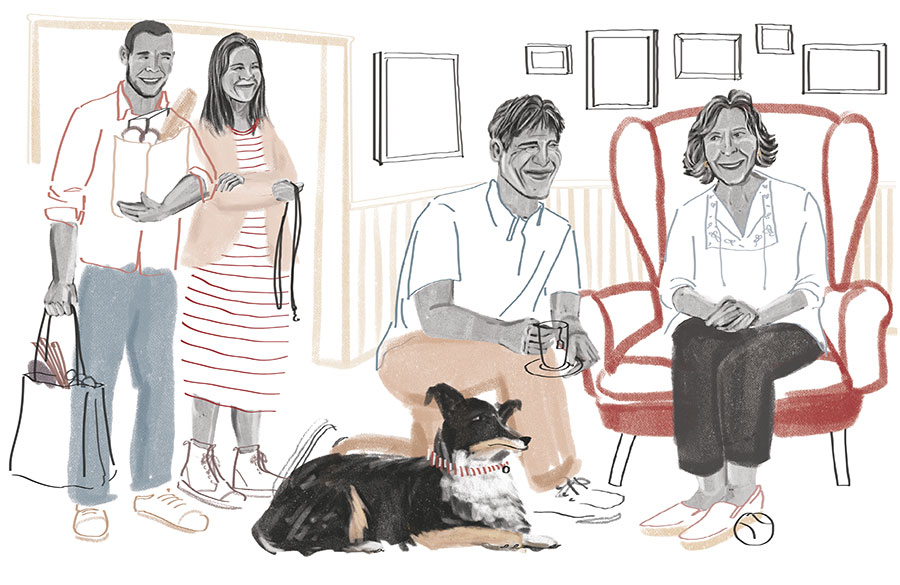
“You don’t go to the doctor and say, ‘I need XYZ medication’; you talk about your problems, not solutions,” Leda says. “And I thought when discovering technology, it should be exactly that.”
Alz You Need informs users about available options like automatic pill dispensers, a tablet for older adults called GrandPad, and clocks that remind Alzheimer’s patients to do something at a specific time of day. “Technology can support day-to-day tasks, cognitive engagement, and health tracking in a variety of ways,” Leda says.
In 2016, she received $15,000 from the TIA Entrepreneur’s Fund and spent the summer in Hamilton developing the platform. Alumni mentors in the program helped fill knowledge gaps about strategy, customer acquisition, and a marketing plan. “Those relationships were critical because they gave me a set of eyes and thought partners in an area of expertise I hadn’t developed yet; when you’re 19, trying to build something, it’s so trial by error.”
Toward the end of her senior year, Leda signed an offer with LinkedIn for a rotational business program, but she had six months between graduation and its start. She dedicated those months to furthering Alz You Need, with the support of three Colgate interns. Speaking engagements gave Leda the opportunity to spread the word and build her customer base. Ever since, she’s maintained the venture as a lifestyle business. “I’ve continued to keep the database up to date so I can make sure families are finding valuable technologies,” she says. In an average month, there are approximately 400 users on the site.
Eva is now 62 and has progressed into the later stages of the disease. Over the years, Leda has used her platform to find solutions for the problems they’ve faced, such as Eva’s wandering.
The disease has taken an emotional toll on their small nuclear family. For Leda’s dad (the “Caregiver in Chief,” as he’s referred to on the company’s website), there are feelings of isolation as he watches his wife change. For Leda and her brother, “it’s flipped the script of going from child to parent; those roles have reversed in terms of responsibilities,” she says. The two serve as their dad’s sounding board for making tough decisions. And then there’s just “being there to love our mom and spend time with our mom in whatever form that looks like, which is always changing.”
Families need to be in a position to support their loved ones, as Sherry points out. In Leda’s case, her mom was relatively young, and they didn’t have a plan in place. But for her dad, they have “every scenario mapped out, papers in order, power of attorney,” Leda says. “That allows you to make better decisions in real time when things do happen,” she adds.
“Today’s youth have to think about how we want to age. Our decisions now and us using our voices have the biggest impact on that.”
LifeLong Learning in Hamilton is a community-based program, sponsored by Colgate’s Upstate Institute, that provides adults with ongoing education. Spring programming tackled subjects including traditional Chinese medicine, political conflicts tied to religious conflicts, and New York City history.
Radical Contributions
Sandy MacKinnon grew up above the Red & White shop in Bouckville, N.Y., in the ’40s. Her dad owned the grocery store, through which MacKinnon sold second-hand clothes to the migrant workers from the local farms. Seventy years later, MacKinnon owned her own store nearby, in Hamilton, selling thrift clothing, knickknacks, and knitted goods. In this shop, she and Evan Chartier ’14 spent hours chatting about life, knitting, and World War II. “I found it interesting as a Jewish person to hear her stories about the war,” says Chartier, who became friends with MacKinnon when he was a student in Loe’s Sociology of the Life Course.
As part of the class, each student created a digital storytelling project with their elderly partners. In the video “A Life of Love and Friendship During World War II,” MacKinnon remembers air raid drills, food rationing, and competing with other kids to find the largest tin foil ball (scrap drives collected foil, which was used to make explosives).
MacKinnon died last October from COVID-19, a devastating end after fighting breast cancer for 20 years. Chartier had kept in touch with her and planned to visit last year but couldn’t because of the pandemic. He’s recently been in touch with her family (who invited him to visit them in Montana) and hopes that MacKinnon’s story can live on through her video.
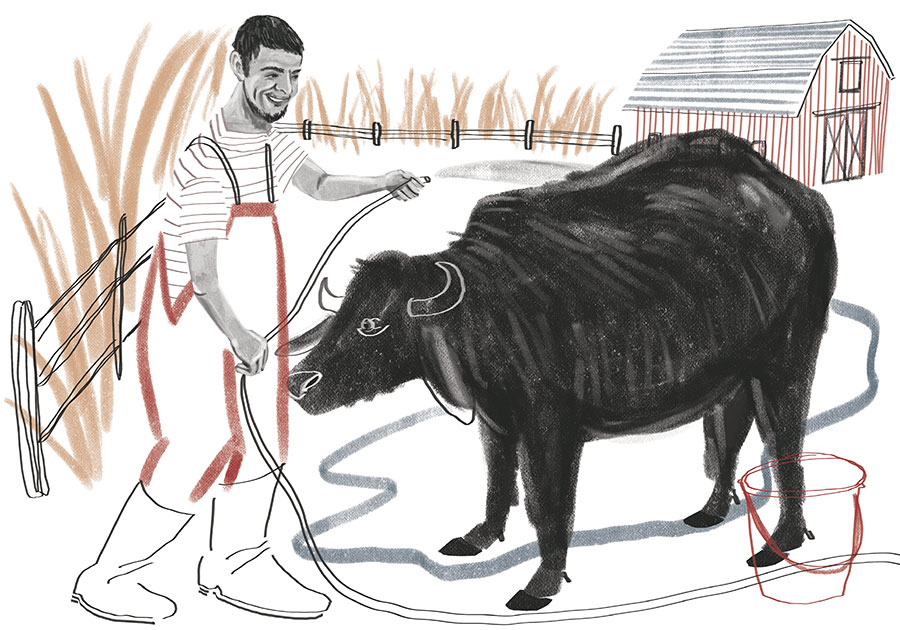
Chartier spent half of last year in Jerusalem, caring for his mom as she underwent chemotherapy for stage four lymphoma. Like Regis, he grew up in a close-knit trio with his mother and brother. “My mom has been the core person in my life; it was an easy decision to go take care of her.” His mom, Sylvia, worked in elder care, aiding a woman with early onset Alzheimer’s, right up until the day she started chemotherapy (only stopping upon her doctor’s insistence).
Sylvia’s in remission, and Chartier has returned to building his tiny house — and caring community — in Craftsbury Common, Vt. “The people out here are used to doing things on their own: they’re farmers, they’re homesteaders, they’re folks who have built their own houses,” he says. “Everyone here is self-sustaining.” But many of Chartier’s community members are getting older. “Vermont has a really aging population, so there’s an opportunity for folks to pitch in and help.”
Through his initiative called Simple Projects, Radical Politics, Chartier wants to “change the world, one project at a time” by meeting community needs while creating alternative economies. To assist retired couple Kelly and Randy, Chartier has done brush hogging on their 100 acres, house sitting so they could take their first vacation in 30 years, and he’ll remodel the back of their house this spring. For George and Rachel, who live on the other side of the mountain, he took care of their water buffalo for a few days.
In exchange, Chartier will barter, work under the gift economy idea, and/or receive small payments that he’ll use to sustain himself or pay it forward. “I come from a low-income background, so I’m really good at making do with not a lot of money,” he says. After he built a pole bean trellis for Jennifer, she paid him with pottery she’d made. Recently, he fixed a washing machine for Lynette — a costly repair that would motivate most people to buy a new one. He fixed the appliance in exchange for some plants and a small payment. “If I can keep a washing machine out of the landfill, then I would like to do that, even if it means I’m working for free,” he says. That’s where the “radical politics” comes in.
Another facet of that ideal involves Chartier finding creative ways to support social justice (an area he has focused on as both a women’s studies and sociology major as well as his previous leadership position at Northeastern University). Last year, he was hired by a prestigious New York City high school to facilitate an affinity space for white students as part of an anti-racism initiative. With his earnings, he “chose to redistribute institutional wealth by donating my payment to an organization near the school created by and for LGBTQ people of color,” he explains.
Chartier and his partner, Mary, have lived in Vermont since they decided in 2019 that they wanted to be present for their 9- and 11-year-old nieces. “We made significant decisions to be near the young people in our lives because we want to be part of helping raise them into adulthood,” he says.
His foundation is built on family and a strong sense of community. Growing up, his mom was a childcare provider, and the kids she took care of are still his best friends. Also, his family experienced housing insecurity, so he moved 11 times before the age of 18. He often relied on staying with friends’ families — “which means that I’m not only really close with these folks who are my age, but I’m also really close with their parents” — and he spent a few years in his great-aunt’s assisted living facility.
Now he’s created more extended family and community in his rural Vermont home. Kelly and Randy, for example, say they formed “an instant connection and trust” when meeting Chartier. “His youthful outlook and thoughts on issues and projects is refreshing and motivating to us,” Kelly says. “We both feel very fortunate to have found Evan, and he became more than a helper. He became our friend.”
Colgate Magazine asked some older alumni to consider this thought experiment:
If you wrote an autobiography, what would its title be?
“What’s for Dessert?” — Paul Beardslee ’59, age 83
“Leaving the Campground” — Dave Kluge ’50, age 92, says: This is “from an old Boy Scout tradition; leave the campground better than you found it.”
“Learning and Weaving” — Bob Woodruff ’58, age 84
“Good Luck Plays a Big Role in Life” — Robert Youker ’55, age 87, explains: “A connection with a Colgate classmate at a University of California football game totally changed my 3 years in the Navy and probably helped me get accepted in Harvard Business School.”
“Patterns Through Time: An Ethnographer’s Quest and Journey” — Norm Whitten Jr. ’59, age 83
“Music, An Avocation” — Scott Werner ’59, age 83
“A Gift – A Life of Gratitude” — Tom Cushing ’56, age 85
“From Vicenarian to Nonagenarian” — Richard Bamberger ’51, age 91
“A Good Life as a Foreign Correspondent: From Nazi Germany to America and Back to the New Europe” — Axel Krause ’56, age 87
“Finding a Way to Win” — Fred Dunlap ’50, age 92 (former Colgate head football coach and athletics director)
“Go, ’Gate” — Jack Goodreds ’56, age 86
“My Story With the People Who Passed My Way.” — Earl Signer ’59, age 84
“A Life Shaped by Forty-Five Years of College” — Brad Tufts ’59, age 83
“Count your Blessings” — Stephen Palmer ’59, age 84
“What a Ride — Mutterings of a 100-Year-Older” — Ken Seyffer ’43, age 100

